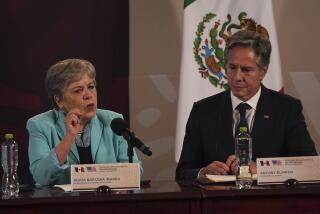COMMERCE : Eager Chileans Take Heart From Passage of NAFTA : Pressure is growing for a free-trade agreement with the U.S. like Mexico’s. And other Latin countries are getting in line.
SANTIAGO, Chile — After NAFTA it’s our turn, Chileans insist.
After Mexico, no Latin American country has campaigned harder than Chile for a free-trade pact with the United States. And now that the U.S. Congress has approved the inclusion of Mexico in the North American Free Trade Agreement, Chile is champing at the bit.
Some advocates of an agreement with Chile argue that it should have been signed even before NAFTA.
Smaller and farther away, Chile would have caused less controversy and resistance than Mexico did, they say. Who could say that free trade with a country of 13 million people on the far end of South America would pose a serious threat to the American job market or trade balance?
The Clinton Administration has given repeated assurances that it wants a free-trade agreement with Chile, but what kind of agreement and how long it would take still isn’t clear.
Other hemisphere countries, including neighboring Argentina, also hope for U.S. agreements and are jostling to be at the head of the line.
American and Chilean technocrats have been meeting this year in preparation for future negotiations on a free-trade agreement, Finance Minister Alejandro Foxley Riesco reported after Congress approved NAFTA in November.
“Groundwork is well advanced,” Foxley told the Chilean press. “Chile is next. Do not have the slightest doubt. That was the exact phrase Clinton spoke to me.”
Chile says that it deserves first consideration because of its longer record of economic stability with free-market and open-trade policies. Although Chile’s market reforms began under military dictatorship, the same pro-business principles of free and fair competition have continued to prevail under democratic government since 1990.
Economic growth since then has averaged more than 6% a year, and this year’s inflation will be about 12%.
American companies have recognized Chile’s economic reliability and potential by investing more than $3.2 billion in the country, and the capital is still coming.
A study by economists with Santiago’s Catholic University estimated that a free-trade agreement would stimulate increases of 20% in Chilean exports to the United States and 30% in imports from the United States over 20 years.
Eduardo Frei, the overwhelming favorite to win Saturday’s presidential elections, has spoken in favor of a U.S.-Chilean free-trade agreement.
Juan Villarzu, Frei’s chief economic adviser, said in a recent interview that free trade is essential for economic development in a small country such as Chile.
“I am tremendously optimistic that we are going to sign a good agreement with the United States, which is important for Chile,” Villarzu said.
But he said the agreement probably would not be reached until 1995.
“The negotiations are complex, and it is going to take time,” he said.
*
Curtis Kamman, U.S. ambassador to Chile, outlined the next steps in a speech last week to the Chilean-North American Chamber of Commerce, which has been pushing for an agreement.
Kamman noted that American implementing legislation for NAFTA requires that the White House submit recommendations by July 1 for negotiating new trade agreements with countries where conditions are favorable.
“We have not yet decided whether our preferred course is additional bilateral agreements with other countries, or their accession to the NAFTA,” Kamman said. He added that he “cannot let you know today when Congress will grant authority for additional negotiations.”
But he emphasized that the Administration wants “to make the NAFTA the basis for hemispheric trade. I believe that we can begin to realize that shared view in 1994.”
More to Read
Sign up for Essential California
The most important California stories and recommendations in your inbox every morning.
You may occasionally receive promotional content from the Los Angeles Times.










